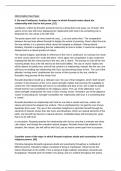2018 English Past Paper
5. Re-read Confluents. Analyse the ways in which Rossetti writes about her
relationship with God in this poem. [15]
Confluents, written by Rossetti, presents God as a being that is far away, out of reach. She
yearns to be near with God, displaying her relationship with God to be something she is
desperate for; she wants to be with God.
The poem opens with ‘as rivers seek the sea […] my soul seeks thee’. The comparative
between the two lines allows Rossetti to display the extent of yearning. Rivers often flow into
the sea entirety; it is a process which cannot be stopped or delayed, it being natural.
Similarly, Rossetti is explaining that her relationship to God is similar; it cannot be stopped or
delayed and is a natural product of nature.
The natural imagery, specifically in reference to the river is continued; ‘as running river moan
on their course alone So I moan left alone’. Once again, the comparative is also continued,
implying that like the rivers journey to the sea, she is ‘alone’. The journey to God will be one
involving death, thus a life will need to be lived and fulfilled. The use of ‘alone’ implies she
will be absent of earthly love, and will not commit to a relationship; instead, like the sea, she
will focus on building her relationship with God, and becoming closer to him. The use of the
aliterate ‘running rivers’ emphesises the course of their journey to the sea, similar to
Rossetti’s long journey till she meets God.
Rossetti describes herself as a ‘delicate rose’; the use of that metaphor, which ‘doth herself
unclose’ in the presence of the ‘sun’s sweet strength’ implies that God has the capability to
control her. Her relationship with God is so intimidate and dear to her, she is able to submit
herself and her soul completely to her religious values. The use of the alliterative ‘sun’s
sweet strength’ emphasises her view of God; it being ‘sweet’. Rossetti’s use of the adjective
‘sweet’ in describing his ‘strength’ exemplifies her relationship with God. It is something that
is ‘sweet’.
Rossetti describes her relationship with God as one that is certain and true, written into
nature and cannot be stopped nor undone. This is emphasised by ‘its goal the river knows,
dewdrops find a way’. The use of the extended metaphors to describe herself through the
elements of natures shows that, like rivers and dewdrops, which are natural elements of the
earth, she herself has become a natural element, embedded deep with knowing her ‘goal’,
that is to be with God.
In conclusion, Rossetti presents her relationship with God as one that is intimate and close.
Like nature, and though the extended natural imagery, Rossetti shows that whatever the
situation, like nature, she will still be with God, just as nature cannot part from its purpose.
Consider some of the ways in which Rossetti explores doubt and uncertainty in her
religious poems. [45]
Christina Georgina Rossetti expresses doubt and uncertainty throughout a multitude of
different poems. Rossetti’s religion consisted of being a Trachtarian, influenced by the
Oxford Movement in the 1840s. Prior to being of Anglo-Catholic orientation, Rossetti was
Evangelican, Rossetti took her beliefs very dearly, and it is evident throughout her poetry.




